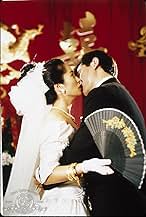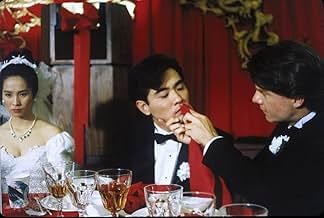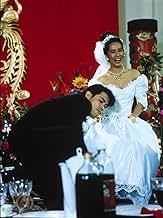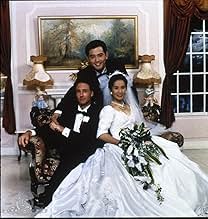Para satisfacer a sus molestos padres, un casero homosexual y una inquilina aceptan casarse por conveniencia, pero sus padres llegan de visita y la situación se sale de control.Para satisfacer a sus molestos padres, un casero homosexual y una inquilina aceptan casarse por conveniencia, pero sus padres llegan de visita y la situación se sale de control.Para satisfacer a sus molestos padres, un casero homosexual y una inquilina aceptan casarse por conveniencia, pero sus padres llegan de visita y la situación se sale de control.
- Nominado para 1 premio Óscar
- 13 premios y 11 nominaciones en total
- Mrs. Gao
- (as Ah-Leh Gua)
Reseñas destacadas
And while I found the ending of this movie somewhat unrealistic (I'll let other viewers decide) I also found the film challenging and optimistic (which is where my realism takes over).
You should watch this movie if you are Asian gay Asian AND gay or simply want to learn something about another culture. You might be surprised!
Props to Ang Lee for creating a unique opportunity to look into two very distinct and different cultures at the same time: Asian American and gays in the early 90s.
Wai-tung (Winston Chao) is a gay Taiwanese landlord in New York with his boyfriend Simon (Mitchell Liechtenstein). Having not admitted his sexual orientation to his parents, he is pressured by them (and tradition) to get married and to have son to carry the Gao name. Meanwhile, Wei-wei (May Chin) is on the edge of poverty. An Chinese artist living in one of Wai-tung's derelict buildings, she is looking for a green card to avoid deportation. Noticing both situations, Simon suggests they marry out of convenience, but things go wrong when Wai-tung's parents come over to New York and a wedding banquet is held.
Although such a story today would have been regarded as a ordinary for a film plot, Lee's vision at the time it was made was fairly radical for certain sections of society at the time, particularly in conservative Taiwan. Lee pushed the boundaries, even including the first gay kiss scene to appear on Taiwan's screens.
Despite the ground-breaking story and the fact that I am watching it almost 12 years after it was made, I didn't feel that there was a sense of believability in the first half of the film. Characters were very 2D and lacked depth. There was a lot of missing chemistry on-screen, and for most of the first half, I did admit I was a little bored. The second half after the banquet takes place, though, was much better. As the characters are exposed and plots unfold, the story becomes more interesting and was much easier to watch.
However, one other gripe is the fact that the humour doesn't quite make its mark in the movie. There are plenty of opportunities to add the little smiles on peoples' faces, but the attempts to do so were fairly weak. The only time I let out a chuckle was in the City Hall wedding ceremony. Simply put, it doesn't match Ang's third film, Eat Drink Man Woman, in this respect.
Overall though, this is a watchable film, and you can easily see that Lee has developed his techniques quite a long way since his early films. The Wedding Banquet certainly demonstrates why people had faith in him and recognised his talent in the early days. One for a look back.
After ten years, this film still does not seem dated at all, which I thought it would. The only thing missing is a HOT love scene with Winston Chao and Mitchell Lichtenstein, who looks far younger than his age. I know if I was in that situation, I'd want to blow off some steam! The best part is the just before finale, the father has a great quiet scene with one of the other cast members. Have some tissues on hand for the ending.
It's best to own a copy of this film, that way you won't be tempted to watch it every time it comes on "Bravo". It's an absolute delight, one of the best of the decade, definitely in the Top 50 of best comedies of all time, at least.
¿Sabías que...?
- CuriosidadesEl banquete de boda (1993) has the highest cost-to-return ratio of 1993, earning $23.6 million from a budget of $1 million. This gave it a of 23.6 ratio, considerably higher than 1993's biggest money-maker "Jurassic Park" whose ratio was 13.8.
- PifiasDuring the small family dinner to which Simon treats the newlyweds and Wei-Tung's parents, Simon can be seen to alternately hold chopsticks, a small bowl or nothing in his left hand, depending on the camera angle.
- Citas
Justice of the Peace: Okay, now you: "I, Wee-Wee..."
Wei-Wei: Wee-Wee.
Justice of the Peace: "... take you, Wai Tung..."
Wei-Wei: Wee-Wee.
Justice of the Peace: Okay. "To be my wedded husband... to have and to hold..."
Wei-Wei: Holding to have, husband, mine...
Justice of the Peace: "... for better, for worse, for richer, for poorer..."
Wei-Wei: Better and richer, no poorer.
Justice of the Peace: "... in sickness and in health, till death do us part."
Wei-Wei: Till sickness and death.
Justice of the Peace: Groovy. Rings.
- Versiones alternativasRemade as the English language version "The Wedding Banquet" (2025), with James Schamus co-writer on both.
- Banda sonoraThe Wedding Banquet
Selecciones populares
- How long is The Wedding Banquet?Con tecnología de Alexa
Detalles
- Fecha de lanzamiento
- Países de origen
- Idiomas
- Títulos en diferentes países
- The Wedding Banquet
- Localizaciones del rodaje
- Empresas productoras
- Ver más compañías en los créditos en IMDbPro
Taquilla
- Presupuesto
- 1.000.000 US$ (estimación)
- Recaudación en Estados Unidos y Canadá
- 6.933.459 US$
- Fin de semana de estreno en EE. UU. y Canadá
- 134.870 US$
- 8 ago 1993
- Recaudación en todo el mundo
- 6.933.459 US$
- Duración
- 1h 46min(106 min)
- Color
- Relación de aspecto
- 1.85 : 1





























